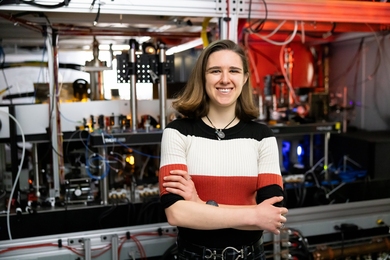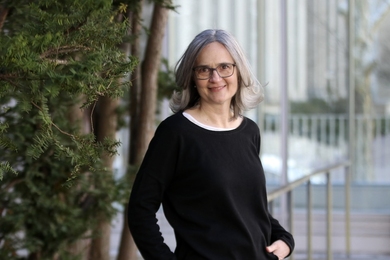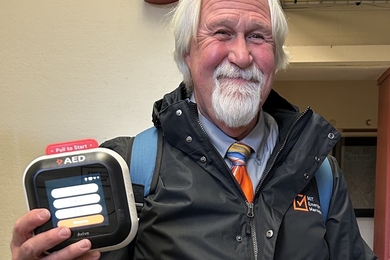In Hebrew, the word "Hibur" means connection -- an appropriate name for a program designed to create a connection between MIT and the Technion-Israel Institute of Technology in Haifa, Israel.
Hibur: An MIT-Technion Link is an MIT-Hillel-sponsored program started by students last year.
"We see the Technion and MIT as a perfect match," said third-year electrical engineering and computer science major Chaim Kutnicki, one of Hibur's co-founders.
Kutnicki was interested in studying at the Technion following his freshman year at MIT. While exploring the possibility, he found that many professors had formed personal relationships with the Technion over the years, but that "there were no institutional frameworks in place," he said.
Kutnicki went to Israel on his own, but when he returned, he and co-founders Maxim Shusteff (S.M. 2003) and Sam Korb (S.B. 2005) sought funding for a program that would make it easier for future students to study at the Technion and vice versa.
"Hibur really started as a grassroots effort," said Kutnicki.
The three secured funding for Hibur's first year from the Combined Jewish Philanthropies Boston-Haifa Connection, Avi Chai Grants of International Hillel, MIT Hillel's Israel Initiative and the Technion.
In its first year, 2005, the program attracted 18 MIT members, including both graduate and undergraduate students.
Over the course of the year, students bonded through a pen-pal program, video conferencing and conference calls and then finally, groups from each university visited the other's campus.
MIT participants were matched with 14 Hibur members in Haifa. They exchanged weekly e-mails, becoming friends through the exchange of ideas, photos and personal anecdotes.
Sophomore Talia Gershon of materials science and engineering played matchmaker, trying to connect students with similar interests. It was a success, she said. "The relationships became more than just professional."
Kutnicki agreed. "There are a number of people who are actually pretty good friends now," he said.
Students and faculty used technology to deepen the bond, holding a series of video lectures simultaneously in Haifa and Cambridge.
MIT speakers at the lectures included Institute Professors Robert Langer and Joel Moses as well as Frederick Salvucci, a senior lecturer in the Center for Transportation and Logistics and the former Massachusetts secretary of transportation, and members of the Technion faculty.
During the video conferences, MIT students were able to sit facing a screen showing the Technion students, with the speaker in the middle. After months of corresponding via e-mail, "it was very exciting to virtually meet," said Miriam Rosenblum, Jewish chaplain and director of MIT Hillel. Rosenblum has served as advisor to Hibur.
The conferences also afforded students and faculty a chance to glimpse the cutting-edge research at each other's schools.
"The presentations were fascinating and informative," said Rosenblum, who recalled one small quirk: a time delay, which sometimes meant the students on the live side laughed at a joke the other side did not hear for another couple of seconds. "They could tell when something was about to be funny," she said.
Twelve MIT participants made the first campus visit, arriving in Haifa on May 22. In the two weeks they spent in Israel, they toured the Technion, attended classes, visited companies, went on day trips, had dinner in the homes of host families and attended a holiday bonfire on the beach before coming back to the States on June 1. "It was an intense schedule," said Rosenblum.
When the Israeli students came to Boston in September, the schedule was similar. Still, students found the time to form relationships -- and potential partnerships -- that will last a lifetime. "It was one of the most amazing experiences of my life," said Gershon.
Hibur continues to evolve. At the end of 2005, Hibur accepted applications from MIT students interested in internships in Israel during the summer of 2006. They are currently matching resumes with companies.
"We are working on several different levels," said Kutnicki, who hopes that someday Hibur will become an official MIT program.
In September 2005, Chancellor Phillip Clay spoke at a faculty and administrator dinner held for the Technion students. "Hibur is one of a growing number of programs that allows students to get a taste of what it is like to work in an international setting," he said. "I believe this is an undervalued part of undergraduate education at MIT and one that we should support for more students."
Hibur is currently looking for students interested in joining the 2006 delegation. There will be an information session on Feb. 15 in W20-407. For further information, visit www.hibur.org or contact MIT Hillel at x3-2982.
A version of this article appeared in MIT Tech Talk on February 8, 2006 (download PDF).





